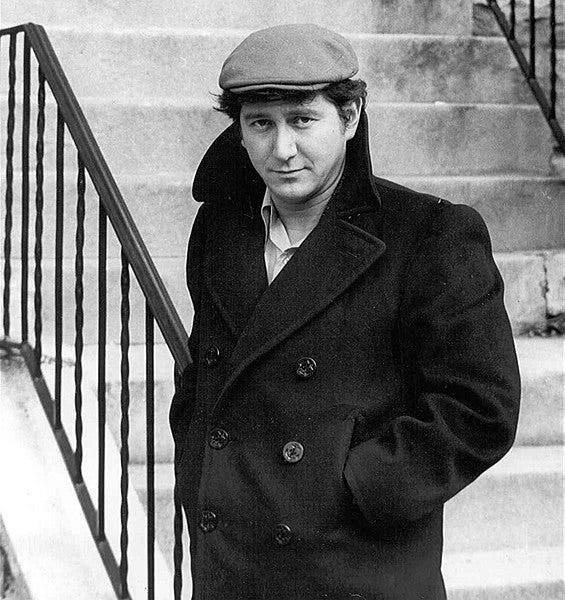On his DarkHorse podcast, Bret Weinstein has said, “The question today is not whether you are a conspiracy theorist, but if you are any good at it.” The millennial podcast hosts of Psyop Cinema, You Can't Win, and Subliminal Jihad, several of whom are PhD students and all of whom are avid researchers, are pretty good at it.
While the Psyop Cinema hosts have converted to Orthodox Christianity and frequently criticize the pervasiveness of gnosticism in entertainment, the hosts of Subliminal Jihad are Muslims as well as leftists/ Marxists, and they occasionally mesh strands of social justice with conspiracy theories. Their podcasts are informed by their perspectives but not overwhelmed by them (I haven’t yet determined the overall outlook of the You Can’t Win hosts).
Image: 20111015 174748 phil-ochs (cropped).jpg/ Wikimedia Commons
These podcasts cover a range of “conspiracy” territory while basing their conclusions on deep research. Subliminal Jihad has not only done deep dives into music industry figures such as The Grateful Dead, Phil Ochs, and Taylor Swift (Psyop Cinema has also covered Taylor Swift but from an entirely different perspective), they have also delved into topics ranging from quantum physics to Covid to Jonestown to the rise of psychedelic therapeutics. All of the podcast hosts retain skepticism while not automatically dismissing any conspiracy. They can pick apart the phenomenon of Q or Sound of Freedom while demonstrating that the Epstein, DEN, and Franklin Scandals carry weight.
Image: Taylor Swift NOW Super Saturday Night IMG 0791 edited (32776592350).jpg/ Wikimedia Commons
Interestingly, all three podcasts have been influenced by the work of Boomer author Dave McGowan. While skeptical of Alex Jones, the Subliminal Jihad hosts are fans of the work of Mae Brussell. Needless to say, they are also fans of Thomas Pynchon. I have yet, however, to hear any of them reference Bill Cooper, the father of “do your own research.”
Image: Joseph Haynes - Death on a Pale Horse - B1977.14.12090 - Yale Center for British Art.jpg/ Wikimedia Commons
Growing up as an Xer prior to the internet era, researching topics was more difficult, and if I uncovered a tidbit of alternative culture or perspective, I tended to take it at face value. Millennial and Zoomers have a deluge of information at their fingertips, so they can afford to be more skeptical and to dig deeper (Subliminal Jihad has also done an episode on Josh Harris). The question will be, are they any good at it.
Dimmed by the Deluge
Andy Warhol signing autographs.jpg/ Wikimedia Commons In 1990, eight years after its publication, the book Edie: An American Biography, the oral history of the life of 1960s Warhol “superstar” Edie Sedgwick by the author Jean Stein (RIP), captured my attention. During that pre-internet period, I would attempt to track down old magazine articles about S…
To promote viewpoint diversity, Heterodoxy in the Stacks invites constructive dissent and disagreement in the form of guest posts. While articles published on Heterodoxy in the Stacks are not peer- or editorially-reviewed, all posts and comments must model the HxA Way. Content is attributed to the individual contributor(s).
To submit an article for Heterodoxy in the Stacks, submit the Heterodoxy in the Stacks Guest Submission form in the format of a Microsoft Word document, PDF, or a Google Doc. Unless otherwise requested, posts will include the author’s name and the commenting feature will be on. We understand that sharing diverse viewpoints can be risky, both professionally and personally, so anonymous and pseudonymous posts are allowed.
Thank you for joining the conversation!
Top image: Dollarnote siegel hq.jpg/ Wikimedia Commons








I'm returning to the top of the Comments here to summarize what at least some of my points have been in this long threaded conversation about conspiracy theories and related matters. I am glad if the podcasts you've identified are helpful on complicated and fraught issues, political, cultural, technological, or other spheres of discussion and. debate. I'm not persuaded that there's a "proper" way to be a conspiracy theorist (if that's a intentional provocative framing to elicit interest, then great, of course). I'm also convinced there are scholars who've deeply researched conspiracy theories and don't conflate them with well-reasoned dissenting viewpoints and perspectives based on facts and evidence, and who understand the psychology of conspiracism. In other words, there's a qualitative difference between conspiracism and dissent. I also think there are hazards with pointing too much to "alternative" sources if they start to displace experts and institutions that shouldn't be dismissed out of hand just because they're "mainstream". I think there's a more nuanced way of thinking about both: I call it "calibrated trust"--using skepticism but in an open-ended way.
On the matter of conspiracy theories, I'm including here a post I wrote this morning about the Kennedy assassination's endless conspiracy theories and U VA Center for Politics' careful approach to studying that event. (Full disclosure: I posted this in the HxLibraries' portal). Their brief comments summarize my own understanding of what conspiracy theories are and what gives rise to them, and how to think about them.
***************************************************************************
(My comments on the portal): On the subject of conspiracy theories: most of us know that the JFK assassination spawned large numbers of such theories, and like all other conspiracy theories, they have certain features. The U VA Center for Politics, a quite reputable and responsible institute with seasoned scholars and well-trained graduate students--unlike the conspiracy theory industry around the Kennedy assassination--is conducting a review of records from the National Archives to determine what we know and can't know about that event. This is the way real investigation and inquiry should work, through disciplined scholarship, not through the mental gyrations and motivated reasoning of those who are incentivized by the repetitional benefits and tribal bonding that come from conspiracy theorizing.(end of my comments)
Italics in the preamble below are mine.
@Center for Politics at U VA
As we get closer to the 60th anniversary of JFK’s assassination, we’re seeing rampant conspiracy theories get new life. Conspiracy theories can flourish during moments of crisis & social upheaval & when we don’t have all the information or only partial truths. Psychologists have shown that our brains are just wired to be suspicious for the sake of our own survival. People are drawn to conspiracy theories because of our need for knowledge, to feel like we have power over the things that happen to us & to feel good about ourselves & the social groups to which we belong.
Once conspiracy theories are out there, though, it’s very difficult to combat them. That’s why we’ve spent decades researching and revisiting #JFK assassination documents. Getting to the “truth” & creating a strong historical record is hard work. And with that long intro, here’s today’s anniversary post from our findings:
[Anyone interested in the new findings from extensive research conducted by U VA's Center for Politics should follow them on twitter--they're releasing new information based on their review of records from National Archives].
Susan,
Thanks for posting this article. I was not aware of any of the sites you mention so it's expanded my view a bit of what some of those who DYOR ("do your own research") actually do. They're doing "research" of a sort, I suppose, though I have some caveats even with the nuances you've described.
I'm trying to model the HxA Way here with the precept, "Make Your Way With Evidence", though there are times when I think that admonition needs to be more carefully articulated to include the quality of evidence.
In thinking about groups like these--and many others that engage in DYOR, I'm thinking of some research by well-established scholars who've spent decades studying conspiracy theories--those include Uscinski (on Rob's list below), as well as Drochon and Klofstad, who've done extensive work on the demographics of conspiracy theorists on an international level:
https://www.taylorfrancis.com/chapters/edit/10.4324/9780429452734-3_1/conspiracy-theorists-steven-smallpage-hugo-drochon-joseph-uscinski-casey-klofstad
Is there something about Millennials and Gen Z that makes them better at DYOR and addressing conspiracy theories--your article seems to be suggesting that the groups you've identify have some facility in this arena that allows them to be both appropriately skeptical but also engage in sifting out appropriate information from the welter of conspiracy theories out there, unmediated and spread on social media rapidly? Or are Millennials and Gen Z no better at this ability with DYOR than any of the rest of us?
I'm thinking especially of the story that burst out this week with the TikTok videos of Osama bin Laden's infamous "Letter to America" explaining why Al-Qaeda's attacks were perfectly justified. Damon LInker's substack article describes the viral spread though I assume you and others have seen it elsewhere, multiple times by now: https://damonlinker.substack.com/p/the-age-of-information-tidal-waves
Are Gen Z students, especially, capable of discernment enough or have sufficient historical knowledge, to engage in DYOR--is this viral spread of TikTok videos of a terrorist counter-evidence against their ability to be discerning or grounded in anything approximating reliable contextual information? (I'm sure I'm also thinking of numerous of the ongoing protests and rallies in recent weeks following the Hamas attacks that reveal lack of historical and geographical knowledge).
So is this an open question about the ability of these two age cohorts, or any of the rest of us, to be adept at DYOR?
I'd point to a NY Times article by philosopher Ballantyne and psychologist Dunning from last year, "Skeptics Say Do Your Own Research; It's Not So Simple" https://archive.li/NhyjE for a good distillation of caveats about DYOR. The two of them don't say that "do your own research" is never appropriate but urge better methods for DYOR.
Also, even a casual search in Google Scholar turns up articles urging cautions about DYOR, by scholars who've spent much time with this "democratic" approach to doing research which often ignores experts and reliable sources:
"Do Your Own Research!"
https://link.springer.com/article/10.1007/s11229-022-03793-w?fbclid=IwAR1FBtgpjcDQMUrGNSDpWBvFIc61ivAmYTCKzgXYR2bnFNB0VAsj5bXIgIE
"Do Your Own Research: Misinformation, Ignorance, and Social Media"
https://journals.sagepub.com/doi/abs/10.1177/14778785221113620
"Do Your Own Research" (Ballantyne, mentioned before)
https://journals.sagepub.com/doi/abs/10.1177/14778785221113620
"Do Your Own Research: Everyday Misinformation and Conspiracy in Online Information Worlds"
https://www.ideals.illinois.edu/items/126257
My ongoing concerns about DYOR is that those who engage in it to a huge degree may become entirely too skeptical of "mainstream" sources and dismiss reliable experts and scholars--who by no means are not infallible but who provide some guideposts and reliable points of reference especially in areas where I don't have knowledge or expertise.
Also, and finally, the lead-in with a quote by Bret Weinstein. If he really thinks that we're all conspiracy theorists to some degree or another, it's just how well we engage in conspiracy theorizing, I totally disagree. He has become known for opinions like this one in recent years because of his own conspiracy-theorizing. He would do well, since he's an educated person in one specialty, to practice some intellectual humility of his own and not proselytize about highly specialized areas where he is not an expert. It's the declarations of certainty by individuals like him that are actually causing larger problems in our civic culture. Relatedly, I'd suggest the recent and going work by the Templeton Foundation on this linchpin intellectual virtue of intellectual humility, with actual research on what it is, how it manifests itself, and how to become better at it, for all those who engage in DYOR.
https://www.templeton.org/discoveries/intellectual-humility